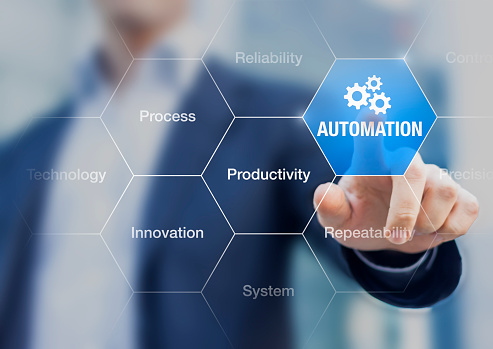
©NicoElNino/ISTOCK/THINKSTOCK
Many CFOs are loath to consider AI because they see it as a risk. According to Intacct's Chief Technology Officer Aaron Harris, however, automation will be a key resource that the finance industry must embrace. FEI Daily spoke with Harris about where automation is intersecting with the financial industry today and how CFOs can refocus on strategy by embracing AI.
FEI Daily: Why is an understanding or AI and machine learning so important for financial executives?
Aaron Harris: First, AI and machine learning are going to transform the way the accounting staff works and require staff to start developing a different set of skills. If you look at the way a lot of large accounting organizations work, you've got a lot of specialization. You may have an employee who does nothing but enter all of the vendor bills and another employee who's issuing checks and payments to vendors. The promise of AI and machine learning is that over time we're going to be able to automate a lot of that process.
 But, AI is also going to require people to be able to come in and review any exceptions where the artificial intelligence can’t code something properly. Our expectation is that employees that go into this field are going to have to be more versed in technology than they have in the past. The whole field of machine learning and AI is heavily dependent on statistics. You'll get a basic level of statistics through any accounting program but I think the people who really excel in the field are going to be people who march down the path towards being data scientists. That's the kind of foundational learning they're going to need to really be effective in this new environment.
But, AI is also going to require people to be able to come in and review any exceptions where the artificial intelligence can’t code something properly. Our expectation is that employees that go into this field are going to have to be more versed in technology than they have in the past. The whole field of machine learning and AI is heavily dependent on statistics. You'll get a basic level of statistics through any accounting program but I think the people who really excel in the field are going to be people who march down the path towards being data scientists. That's the kind of foundational learning they're going to need to really be effective in this new environment.
Second, AI is going to replace the user experience for a lot of users. And it'll expand the level of access to the system. In large organizations the CFO doesn't necessarily even have a log-in to the ERP system. They don't need it. With AI, the idea that we can put that right on their phone so they can ask a question without having to get into the user experience. ‘Please tell me what our margin was for last quarter.’ ‘Please email me the revenue report with a break-down for our top 10 customers last quarter.’ It’s going to get more people into the accounting platform.
FEI Daily: As we all know, CFOs are spread incredibly thin these days and must find a balance between strategy and operation. How will AI and machine learning impact that struggle?
Harris: CFO's are spending far too much time on the operations side of the business. Most of their time is spent insuring that they can get an accurate look at the past. For example, they're working to optimize their processes to get the books closed so that six or 10 days after the month ends they can produce financial statements. The idea is that with all the advances in machine learning and AI, the CFO will finally be able to tip the scales back to strategic thinking. What I'm telling analysts is that we're going to go from a world of audits that happen periodically far after periods are closed to continuous audit. The close is going to go away. It's going to be a continuous close where you're constantly reviewing feedback from AI and machine learning and making decisions about how to handle certain transactions.
Traditionally, ERP systems came with pretty basic reporting, mostly tailored to the operational sides of things. With improvements in technology we're now getting to a point where we can actually embed real time analytics right on top of your ERP transactions. When you pair that with machine learning, that real time analytics can start to evolve to predictive analytics.
You’ve been spending all of your energy just making sure that the past is actually accurate. We want to get you looking at the future and we want all of that operational stuff to automate itself.
FEI Daily: Where is automation intersecting with the financial industry today?
Harris: As we're going from ASC 605 to ASC 606, there's a lot of complexity in actually following that guidance. The days of being able to do that in spreadsheets are over. You really need a system that can do this for you. That's one side of the state of the art today for automation.
The other side is web services and APIs. Legacy ERP systems relied on bulk imports, manual data entry, batch transaction processing that led to latency in the information capture and often led to a lot of manual work, which leads to errors and uncertainty in the quality of the data. Today, you can leverage APIs to automate any repetitive transaction in the accounting world: all of your front-end sales transactions, automating a lot of the vendor- and purchasing-related transactions. That's where we are today and I think you're already starting to see this with a lot of applications.
Where we're moving to is using AI and machine learning to take all of those non-routine transactions where AI and machine learning are going to be able to automatically understand the nature of that invoice based on what they've learned, categorize the invoice, take the appropriate accounting action and get that into the system.
FEI Daily: When do you predict that will happen?
Harris: It's moving really fast. We already have a machine learning platform deployed within Intacct. We're using it in our internal development processes to drive quality assurance activities. That's a preliminary step for us to see if we can learn from what's happening in our world and use that to drive better quality activities. The next step for us is to start applying it to fraud detection.
Over the next couple years you're going to see a radical transformation in the way these systems work. AI is going to be a core part of the user experience. Machine learning is going to be adding a layer of validation and inspection to everything that's going on. I think what's going to hold us back is the access to great talent out there. As we built out our machine learning capabilities at Intacct, what became obvious very quickly is that this isn't something that requires us to have great computer scientists. What we need are data scientists.